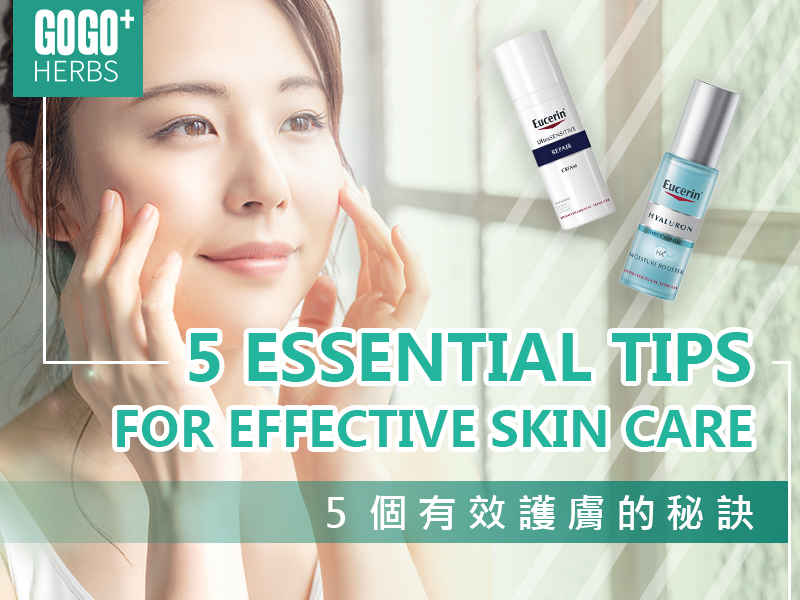
5 Essential Tips for Effective Skin Care
Skin care is an important yet largely neglected aspect of health care. The skin is the largest organ of the human body and a vital protective shield between the body and the external environment. It is germane to note that the human skin requires constant hygiene and proper maintenance to flourish and function properly. But unfortunately, we often tend to take basic skin care for granted-and this is particularly due to our less appreciation and comprehension of the many importance of the skin to our body.
This commentary dwells on the relevance of basic skin hygiene in our skin care regimen. It further emphasizes the need for us to wash, bathe, or shower at least daily, and apply a variety of creams and moisturizers to stay socially clean and maintain an attractive appearance.
Common Skin Conditions among Adults
A major skin condition among adults is dry skin. Dryness of the skin can cause it to become irritable and sore, which could contribute to a chain of skin comorbidities in adults such as eczema, skin breakage, and surface inflammation. Typically, Dry skin occurs when there is an increase in transepidermal water loss to the surface of the skin and a reduction in the water content of the upper layer of the epidemic, also known as horny layer (stratum corneum). The dry condition of the skin is usually accompanied by an intense urge to scratch where the skin loses its elasticity, becomes brittle and scaly, and escalates into painful cracks.
Another popular skin challenge among adults is found among the older age-range. Skin deterioration in old age is wholly normal, just as facial aging is a natural biological process and is therefore inevitable.
Old age is challenged by a gradual reduction in the elasticity in the skin and decreased levels of collagen leads to wrinkles formation the appearance of sagging. However, more factors such as stress, diet, substance abuse, and chronic disease may contribute to the aging process .
The Relevance of Basic Skin Care to Our Daily Regimen
In normal circumstances, the human skin is generally soft and supple. However, as a large external organ to the body, the welfare of our skin is largely threatened by many external factors as well as other parameters such as biological decline and our habitual lifestyle at a point in time. This makes the human skin a changing organ, typically responsive to internal factors such as the level of our hydration, the choice of food we eat, and even our medication. On the flip side, some external factors of skin care include air humidity, irritants, allergens, and UV radiation/extreme temperatures.
In the tail end, only the practice of basic skin care can ensure that the multi-factorial causes of unhealthy skin are curbed or brought to the barest minimum. Maintaining healthy skin at every part of our body ultimately requires our consciousness, continuity, and cleanliness to facilitate its physiological functions and reduce its general wear and tear, especially during the period of aging.

8 Functions of the Skin You Should Know
The skin is a vital accessory organ to the body’s biological needs. Nevertheless, it also assists with our aesthetic needs and expression.
At every point in our social interaction, we subconsciously rely on the skin as a booster of self-esteem, medium of communication, and radiance and ravishing glow. Here are some primary functions of the skin, reflecting the need on why you should embark on a stringent skin care regimen:
- Assists with the Physical protection of the body.
- Aids in Immunological protection-the epidermis and dermis protect against foreign antigens.
- Helps with waste excretion and preservation of water balance.
- Helps the body with temperature regulation
- Specialized nerve endings help us with Sensation eg, pain, itch
- The skin assists the body with energy storage (Subcutaneous fat)
- Promotes vitamin D synthesis.
- Overall skin appearance, lips, hair, and nails promote psychosocial functioning and expression.
5 Skin Care Tips You Should Be Implementing Now
1. Always Cleanse Skin When Specifically Needed, Using A PH Balanced Cleanser And Soap Substitute.
This tip is particularly for situations demanding the eradication of foreign bodies off the top layer of the skin, especially in sensitive areas of the body. These foreign bodies could include leftovers of make-ups, soling, or even excess oil.
Ordinarily, the standard way of cleaning the skins consists of soap and water, and soft wipes or flannels. This practice appears effective and is often carried out with convenience and perceived cost-effectiveness in mind.
However, a plethora of studies suggest that frequent washing of a patient’s skin with soap and water leads to dryness and a decrease in skin condition. These studies opine that soaps have a higher pH level than the skin. Thus they suggest the continued use of soap can affect and result in an overall increase in the skin’s pH, resulting in an increased risk of fungal and bacterial infections.
Due to this reason, manufacturers develop “soapless” solutions that are less irritating, such as baby shampoos. In the end, it is a proper skin care practice, especially for make-up/beauty practitioners and persons with a preexisting skin condition, to resort to PH-balanced skin cleansers and other soap substitutes. This way, they enjoy an alternative means of promoting their skin hygiene and bypassing the adverse effects of soap and its harmful chemical composition.
Most cleaners in the market occur in various forms, such as gels and lotion, depending on preference. However, premium selections , such as the Eucerin Soothing Cleansing Gel , is particularly great for sensitive skin. This product choice features a friendly PH value, and it is passionately moisturizing and effective like its counterparts in the market.
2. Avoid Excessive Friction And Scrubbing – Avoid Massaging Areas Which Could Be Easily Damaged.
This applies to the whole body as well as areas of sensitive skin, eg, the face and genitals. Endeavor to avoid excessive scratching, stroking, rubbing, or slapping the skin. It triggers inflammatory chemicals such as histamine and may result in injury/pressure ulcers.
Moreover, a habitual lifestyle of constant friction and scrubbing on the skin may increase the skin deterioration rate at old age. This is because trauma from shearing and friction is particularly responsible for developing skin tears in the elderly. The apt skin care lesson is to modulate pressure. If possible, go slow and go easy on your skin.
3. Minimize Skin Exposure to Harmful Moisture ( Incontinence, Wound Leakage)
Normally, the skin is slightly acidic with a PH between 4.0 and 5.5. Most harmful substances such as urine are alkaline and could result in an immediate chemical reaction on the skin’s surface. Harmful substances also involve chemical spillage from insecticides and other moistures of high acidic nature. Thus, it is advisable to use a no-rinse cleansers in cases of contact to get rid of contaminants.
4. Use Skin Barrier Product (E.G., Cream, Ointment, Film) To Protect Vulnerable Skin.
Skin sensitivity is often identified by symptoms such as redness, flakiness, tightness, itchiness, increased breakouts, and rashes. These are also signs of a compromised barrier. In other words, this means that your skin may be lacking the ability to prevent the penetration of compounds into the body of the epidermis.
A quick skin care tip to employ a product solution specifically designed to restore and protect severely chapped, cracked, and dehydrated body parts. The Eucerin – Super Sensitive Repair Cream is a typical choice in alleviating skin discomfort (redness, inflammation, dryness or fine particles , etc.) and restore skin barrier function.
5. Use Emollients to Maintain Skin Hydration
Emollients (moisturizers) are the first-line treatment for dry skin. The application of a layer of grease or oil on the skin surface has an immediate softening effect that increases the hydration of the epidermis.
Emollients come in the form of creams, ointments, lotions, bath oils, and even soap substitutes. They contain substances, such as urea and glycerol, which help bind water in the skin, lubricate the skin, and make it supple, elastic, and more comfortable.
Popular products like the 30ml Hyaluronic Acid Moisturizing Serum act as an instant moisturizer, which helps to smoothen fine lines. The bottom line here is to start purchasing beneficial emollients for your skin care regimen as opposed to staying idle and expecting a natural rejuvenation of the skin .
REFERENCES AND FURTHER READING
- Voegell D. Care or harm: exploring essential components in skin care regimens. Br J Nurs . 2008;17(1):24-30. doi:10.12968/bjon.2008.17.1.28056
- Brown A, Butcher M. A guide to emollient therapy. Nurs Stand . 2005;19(24):. doi:10.7748/ns2005.02.19.24.68.c3813
- Kirsner RS, Froelich CW (1998) Soaps and detergents: understanding their composition and Effect. Ostomy Wound Manage 44(3A): 62s–70s
- Held E, Lund H, Agner T (2001) Effects of different moisturizers on SLSirritated human skin. Contact Dermatitis 44(4): 229–34
- Eastern Health (2010) Skin Integrity; its maintenance and support. Http://www.health.vic.gov.au/older/toolkit/09SkinIntegrity/docs/Skin%20 Integrity%20Its%20maintenance%20and%20support%20Attch01.pdf (accessed 20 August, 2020)
- British Association of Dermatologists (2011) Facts about skin. Http://www.bad.org.uk (accessed 20 August, 2020)
Author: Michael F. O
Michael F.O is a ravenous health writer with over five years of experience. He has to himself a chain of certification ranging from a university degree in Biochemistry to other professional honors. Th...




































































